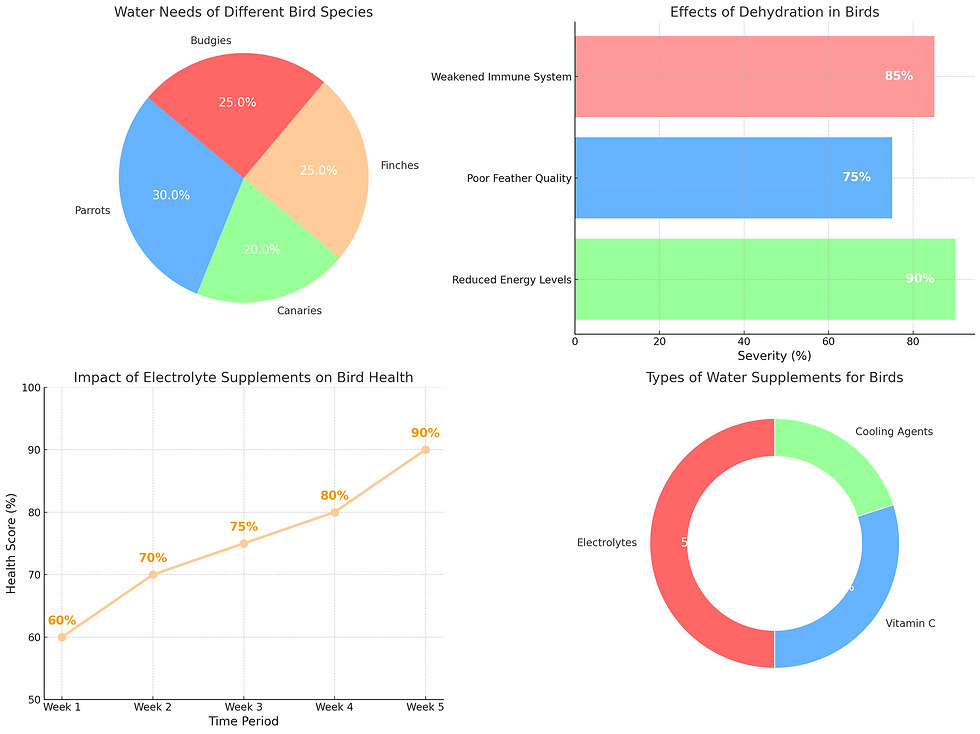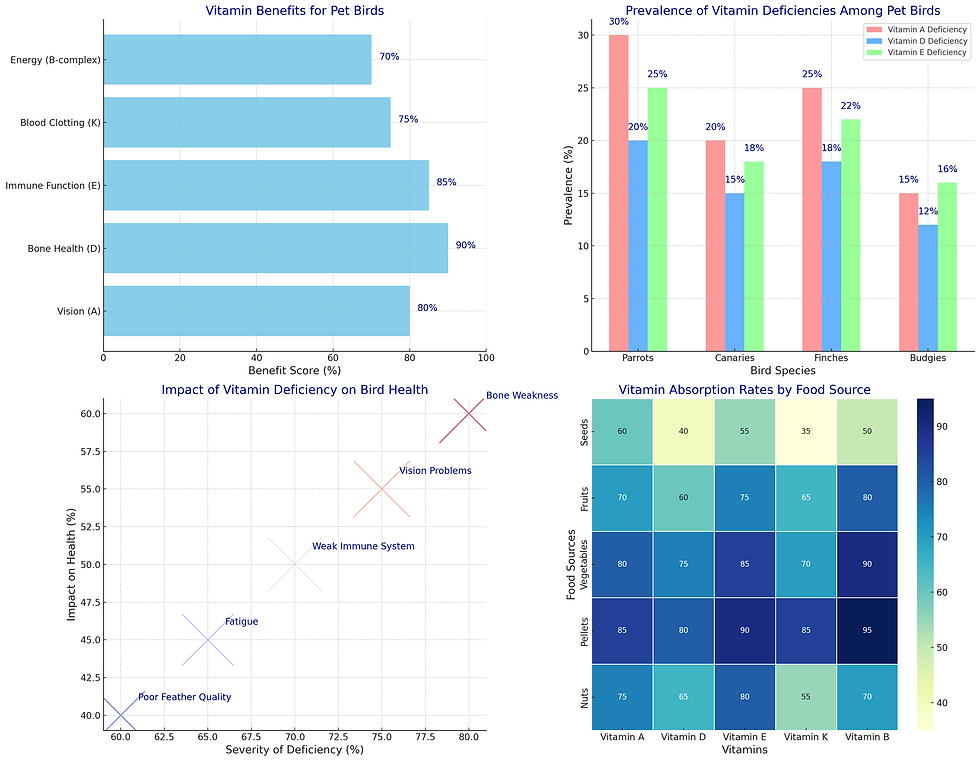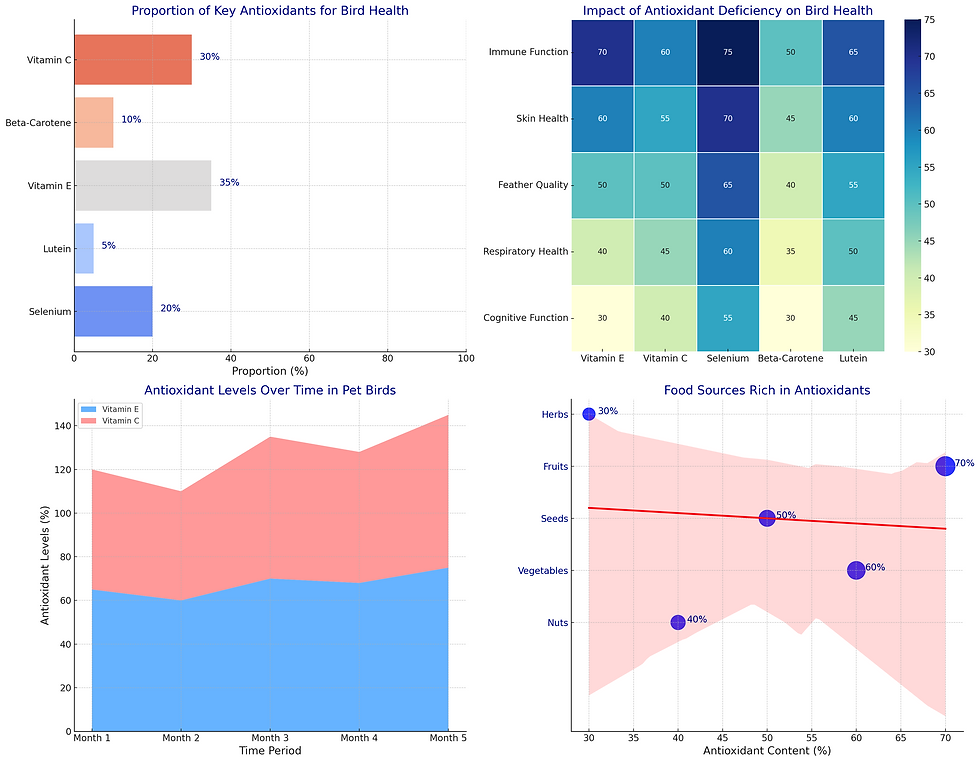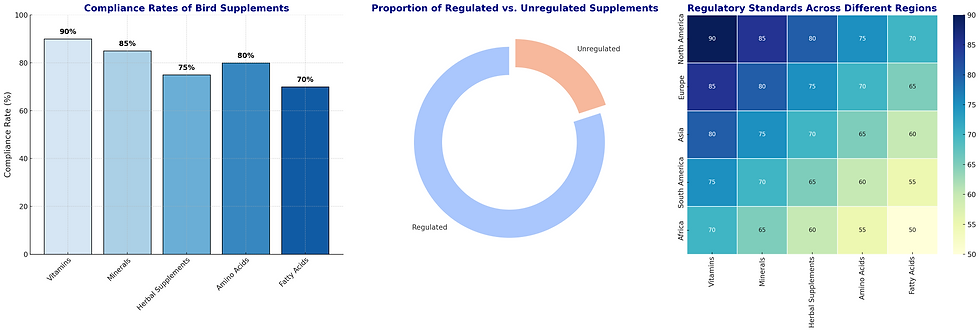Essential Vitamins and Supplements for Birds
- Saifur Rahman
- Aug 14, 2024
- 15 min read

Key Takeaways
Key Points | Description | Implications |
Importance of Vitamins | Vitamins like A, D, E, and K are essential for bird health, supporting vision, immune function, and bone strength. | Ensuring your bird gets these vitamins can prevent deficiencies, leading to longer life and improved overall health. |
Role of Minerals | Minerals such as calcium, phosphorus, and zinc are crucial for bone development, muscle function, and feather quality. | Proper mineral intake helps prevent bone disorders and supports healthy feather growth and maintenance. |
Benefits of Amino Acids | Amino acids like methionine and lysine are the building blocks for proteins, aiding in muscle repair and growth. | Including these in your bird’s diet supports strong muscles, better recovery, and overall growth. |
Fatty Acids for Health | Omega-3 and omega-6 fatty acids are vital for cognitive function, eye health, and inflammation control. | A balanced intake of these fatty acids helps keep your bird’s brain sharp and eyes healthy while reducing inflammation. |
Probiotics and Prebiotics | Probiotics maintain a healthy gut flora, while prebiotics feed the good bacteria in your bird's digestive system. | A diet rich in probiotics and prebiotics enhances digestion, boosts immunity, and improves overall health. |
Electrolyte Balance | Electrolytes like sodium and potassium are essential for fluid balance, nerve function, and energy levels. | Proper electrolyte management prevents dehydration, supports muscle function, and maintains energy levels, especially during heat stress. |
Digestive Enzymes | Enzymes such as amylase and protease aid in breaking down carbohydrates and proteins, ensuring efficient nutrient absorption. | Supplementing with enzymes can enhance digestion, leading to better nutrient utilization and overall health. |
Herbal Supplements | Herbs like echinacea and milk thistle provide natural immune support and liver detoxification. | Incorporating herbal supplements can boost your bird's immunity and improve liver health naturally. |
Species-Specific Supplements | Different bird species have unique dietary needs, requiring tailored supplements for optimal health. | Providing species-specific supplements ensures that each bird receives the precise nutrients they need to thrive. |
Safety and Regulation | Over-supplementation can be harmful. It’s essential to choose high-quality products and follow dosage guidelines. | Following safety guidelines and consulting a vet can prevent health issues and ensure your bird’s well-being. |
Introduction
Did you know that 70% of pet birds live longer and healthier lives when they receive the right vitamins and supplements? Just like us, birds need a balanced diet to stay strong and happy. But sometimes, they need a little extra help to get all the nutrients they need.
Essential vitamins and supplements are the secret to keeping your bird in top shape. These nutrients support everything from strong bones and shiny feathers to a sharp mind and happy mood. When you give your bird the right supplements, you're not just feeding them—you're giving them a healthier, longer life.
In this guide, you'll learn about the best vitamins and supplements for your bird. We'll show you how to make sure your bird gets everything they need to thrive. Let's get started on making your bird the healthiest and happiest they can be!
Understand the importance of vitamins for bird health.
Discover how supplements can boost your bird's well-being.
Learn easy ways to add these nutrients to your bird’s diet.
Hydration and Water Supplements

What is the role of hydration in a bird's metabolism?
Hydration is crucial for a bird’s health. When birds drink water, it helps them digest food, transport nutrients, and maintain body temperature. Just like us, birds need clean water every day to stay healthy. Without enough water, birds can get sick.
Want to learn more about keeping your bird properly hydrated?
How can dehydration be prevented during travel for birds?
Always carry a portable water source.
Make sure your bird has access to water at all times.
Use a bird-friendly travel cage with a built-in water dispenser.
Traveling can be stressful for birds, so it's important to keep them hydrated. Learn more about travel tips for birds.
What are the benefits of adding electrolytes to a bird’s drinking water?
Adding electrolytes to your bird’s water can help them stay strong and energetic, especially during hot days. Electrolytes balance the water in their bodies and keep their muscles and nerves working well.
Discover how to keep your bird's water perfectly balanced.
Why is clean water crucial for a bird's overall health?
Clean water is a must for every bird. Dirty water can make them sick. Always provide fresh, clean water to keep your bird healthy and happy.
Check out more tips on maintaining clean environments for your bird.
What types of water supplements are beneficial for birds in hot climates?
In hot climates, birds can lose a lot of water quickly. Adding cooling agents or hydration boosters to their water can help them stay cool and hydrated.
Learn more about proper nutrition and hydration for your bird.
How do birds lose water, and what are the signs of dehydration?
Birds lose water when they breathe, through their droppings, and especially when it’s hot. Signs of dehydration include drooping feathers and less energy. Always watch for these signs.
For more on keeping your bird healthy, visit hydration needs.
Vitamins for Birds

What is the role of Vitamin A in a bird's health?
Vitamin A is super important for your bird’s vision, skin, and immune system. It helps them see better and fight off sickness.
How does Vitamin D affect calcium absorption in birds?
Vitamin D helps birds absorb calcium, which is crucial for strong bones and eggshells. Without enough Vitamin D, birds might have weak bones.
Why is Vitamin E crucial for avian reproductive health?
Vitamin E is vital for bird reproduction. It protects their eggs and supports their reproductive organs. This vitamin keeps them healthy during the breeding season.
What are the benefits of Vitamin K for blood clotting in birds?
Vitamin K helps birds with blood clotting. If a bird gets a cut, this vitamin helps stop the bleeding quickly, keeping them safe.
How does Vitamin C boost a bird’s immune system?
Vitamin C is a powerful booster for a bird’s immune system. It helps them fight off colds and other illnesses, keeping them strong and healthy.
Can birds synthesize Vitamin B, or is supplementation necessary?
Birds can make some of their own Vitamin B, but sometimes they need extra, especially if they’re stressed. Vitamin B helps with their energy and overall health.
Minerals for Bone and Feather Health

How important is calcium for a bird's bone development?
Calcium is vital for your bird’s bone health. It helps them grow strong bones and lays firm eggshells. Without enough calcium, birds can have weak bones that break easily.
Learn more about keeping your bird’s bones healthy with the right balanced diet.
What are the signs of phosphorus deficiency in birds?
Weakness
Soft bones
Poor growth
Phosphorus works together with calcium to make bones strong. If your bird doesn’t get enough phosphorus, they might feel weak and not grow as they should.
Discover how to prevent deficiencies with a nutritious diet.
How does magnesium contribute to avian muscle function?
Magnesium keeps your bird’s muscles working properly. It helps their muscles contract and relax, allowing them to move and fly smoothly. Magnesium also supports their nerve function, keeping them active and happy.
Why is iron necessary, and what are the risks of overdose in birds?
Iron is needed to make hemoglobin, which carries oxygen in your bird’s blood. However, too much iron can be harmful. It’s important to balance iron intake to avoid health problems.
Read more on how to maintain a balanced diet for your bird.
What role does zinc play in feather health?
Zinc is essential for your bird’s feathers. It helps them grow strong and shiny feathers. Zinc also supports their immune system, keeping them safe from diseases.
Learn more about feather care and health.
How can birds obtain iodine for proper thyroid function?
Iodine supports your bird’s thyroid gland, which controls their metabolism. Without enough iodine, birds might feel sluggish and gain weight. Adding iodine to their diet helps them stay active and healthy.
Amino Acids for Growth and Repair

How does methionine support feather growth in birds?
Methionine is a special amino acid that helps birds grow strong, beautiful feathers. It’s like a building block for their feathers, making them look shiny and healthy.
Why is lysine important for protein synthesis in birds?
Lysine helps birds make proteins, which are needed for muscle growth and repair. It’s crucial for keeping your bird strong and energetic.
What are the benefits of including tryptophan in a bird’s diet?
Tryptophan helps your bird feel calm and happy. It’s important for making serotonin, which helps with mood and sleep.
Discover more about how to keep your bird happy and healthy.
How does arginine aid in avian cardiovascular health?
Arginine helps your bird’s heart stay strong by supporting blood flow. It keeps their cardiovascular system healthy, ensuring they have the energy to fly and play.
Find out more about keeping your bird’s heart healthy with a balanced diet.
Why is leucine essential for bird muscle repair?
Leucine helps birds repair their muscles after they’ve been active. It’s like a recovery boost, making sure their muscles stay strong and healthy.
Can birds synthesize taurine, or do they require supplementation?
Birds can make some taurine on their own, but sometimes they need a little extra, especially if they’re not feeling well. Taurine supports their heart and eye health.
Learn more about how to ensure your bird gets all the important nutrients they need.
Fatty Acids for Cognitive and Visual Health

What role do omega-3 fatty acids play in bird brain development?
Omega-3 fatty acids are like brain food for birds. They help in the development of their cognitive abilities, making them smart and alert. These fatty acids also support their learning skills and memory.
Learn more about balanced diets that keep your bird's brain healthy.
How do omega-6 fatty acids impact a bird’s inflammatory response?
Omega-6 fatty acids help manage inflammation in birds. They work like tiny soldiers, reducing any swelling or discomfort. This keeps your bird’s body in balance and helps them stay comfortable and healthy.
How does DHA (docosahexaenoic acid) support avian eye health?
DHA is a type of omega-3 that keeps a bird’s eyes sharp. It supports their vision, helping them see clearly. Good eyesight is crucial for birds as they navigate their surroundings and find food.
What is the significance of arachidonic acid in a bird's diet?
Arachidonic acid is another important fat that helps birds with growth and cell repair. It’s essential for their overall development and helps them recover quickly from injuries.
Learn more about why this is important in a well-rounded diet.
Are there benefits to including linoleic acid in a bird’s diet?
Linoleic acid helps keep a bird’s skin and feathers healthy. It’s important for preventing dry skin and dull feathers, ensuring your bird always looks its best.
Should birds receive supplementation of EPA (eicosapentaenoic acid)?
EPA is another omega-3 that helps birds stay active and healthy. It supports their heart and reduces inflammation, keeping them strong and full of energy.
Benefits of Antioxidants

How do antioxidants like beta-carotene protect birds from oxidative stress?
Beta-carotene acts like a shield, protecting birds from harmful substances that can cause damage to their cells. It helps them stay healthy and vibrant, reducing the risk of illness.
What is the role of selenium in preventing cellular damage in birds?
Selenium is a powerful protector for bird cells. It prevents damage from harmful chemicals, keeping your bird’s body strong and resilient.
How does glutathione contribute to detoxification in birds?
Glutathione helps birds remove toxins from their bodies. It’s like a natural cleaner that keeps their system clear of harmful substances.
Why is lutein important for avian eye health?
Lutein is a key nutrient that helps birds see clearly. It protects their eyes from harmful light and keeps their vision sharp, so they can explore and enjoy their surroundings.
How can tocopherols (Vitamin E) enhance a bird’s immune function?
Vitamin E or tocopherols, boosts your bird’s immune system, helping them fight off infections. It’s like a protective shield that keeps them strong and healthy.
What are the effects of flavonoids on a bird's cardiovascular system?
Flavonoids are heart-healthy nutrients. They help improve blood flow and keep your bird’s heart strong, ensuring they have plenty of energy to fly and play.
Probiotics and Prebiotics for Gut Health

How do probiotics improve gut health in birds?
Probiotics are friendly bacteria that help keep your bird’s tummy happy. They work by balancing the good bacteria in the gut, making digestion smooth and easy. When your bird has a healthy gut, they feel better and stay strong.
Learn more about keeping your bird's digestive system in top shape with our nutritious seed mixes.
What are the benefits of prebiotics in maintaining a bird’s digestive system?
Prebiotics are like food for probiotics, helping them grow and thrive.
They support a healthy gut by feeding the good bacteria.
This leads to better digestion and a happier bird.
For more on how to support your bird's gut health, check out our guide on fresh foods for birds.
Can probiotics help in preventing bacterial infections in birds?
Yes! Probiotics help prevent harmful bacteria from taking over in your bird’s gut. By keeping the good bacteria strong, they can fight off infections more effectively.
Learn more about keeping your bird safe from infections with parasite prevention.
How do prebiotics support the growth of beneficial gut bacteria in birds?
Prebiotics act like super fuel for the good bacteria in your bird’s gut. When these bacteria are well-fed, they multiply and keep your bird’s digestive system running smoothly.
Are there specific strains of probiotics that are more effective for birds?
Different types of probiotics can help with different things. Some strains are great for digestion, while others help with immunity. It’s important to choose the right ones for your bird to keep them at their best.
How do probiotics and prebiotics work together in a bird’s diet?
When probiotics and prebiotics team up, they create a healthy environment in your bird’s gut. Probiotics provide the good bacteria, and prebiotics help them grow. Together, they keep your bird’s tummy happy and healthy.
Importance of Electrolytes

How do sodium and potassium balance fluid levels in birds?
Sodium and potassium are like the helpers that keep your bird's water levels just right. They make sure your bird stays hydrated and energized, which is super important for their health.
Learn more about how to keep your bird hydrated and happy.
Why is chloride important for maintaining osmotic balance in birds?
Chloride works with sodium and potassium to keep the right amount of water inside your bird’s cells. This balance helps them stay healthy and avoid getting sick.
What role does bicarbonate play in a bird’s respiratory health?
Bicarbonate helps keep your bird’s breathing easy by balancing the acids in their body. This keeps their lungs clear and their breathing smooth, even when they’re flying around.
How do electrolytes assist in maintaining energy levels during heat stress in birds?
Electrolytes help keep your bird cool when it’s hot outside.
They replace the salts lost through sweating, which keeps their energy up.
This helps your bird stay active and happy even in warm weather.
What are the signs of electrolyte imbalance in birds?
When your bird doesn’t have enough electrolytes, they might feel weak or tired. You might notice them drinking more or less water than usual. Keeping their electrolyte levels balanced helps them stay strong.
How can you supplement electrolytes in a bird's diet?
You can add special electrolyte supplements to your bird’s water or food. This helps them stay hydrated, especially when it’s hot or they’re not feeling well.
Digestive Enzymes

How do digestive enzymes enhance nutrient absorption in birds?
Digestive enzymes are like tiny helpers in your bird’s stomach. They break down food into smaller pieces, making it easier for your bird to absorb all the good nutrients. This keeps your bird healthy and full of energy.
What is the role of amylase in breaking down carbohydrates in birds?
Amylase is an enzyme that helps break down carbohydrates like seeds and grains.
This makes it easier for your bird to get the energy they need from their food.
Amylase turns carbs into simple sugars that your bird's body can use quickly.
For more on how to fuel your bird’s energy, check out our guide on seed mixes.
How does protease aid in protein digestion for birds?
Protease is another important enzyme that breaks down proteins into amino acids. These are the building blocks that help your bird grow strong muscles and stay active.
Why is lipase important for fat digestion in birds?
Lipase breaks down fats in your bird’s diet into fatty acids. These fatty acids provide long-lasting energy and help keep your bird’s feathers shiny and smooth.
How do enzymes like cellulase benefit birds that consume plant-based diets?
Cellulase helps birds digest plant materials like leaves and fibers. This enzyme breaks down tough plant cells, making it easier for your bird to get the nutrients they need from vegetables.
Can enzyme supplements improve overall digestive health in birds?
Yes! Adding enzyme supplements to your bird’s diet can help improve their digestion, especially if they have trouble breaking down certain foods. This keeps their tummy happy and their health in check.
Herbal Supplements

What are the benefits of using echinacea in bird health?
Echinacea is a powerful herb that boosts your bird’s immune system. It helps them fight off colds and other illnesses, keeping them strong and healthy.
How does milk thistle support a bird's liver function?
Milk thistle is like a natural cleanser for your bird’s liver. It helps remove toxins and keeps their liver functioning well, ensuring they stay healthy and vibrant.
Can garlic act as a natural antibiotic for birds?
Garlic has natural antibacterial properties that can help fight off infections.
It’s a safe and natural way to keep your bird healthy without the need for chemicals.
Garlic also boosts the immune system, helping your bird stay strong.
How does aloe vera aid in avian skin health?
Aloe vera is soothing for your bird’s skin. It helps heal cuts and scratches quickly, keeping their skin soft and healthy. Aloe vera also hydrates, preventing dryness and irritation.
What are the immune-boosting properties of astragalus in birds?
Astragalus is an herb that strengthens your bird’s immune system. It helps them fight off infections and stay healthy, especially during stressful times.
How can chamomile be used to reduce stress in birds?
Chamomile is a calming herb that helps reduce stress in birds. It can soothe nervous birds and help them relax, making it great for times when they’re feeling anxious.
Discover more about keeping your bird calm and happy with our handling and bonding tips.
Special Supplements for Specific Bird Species

What supplements are essential for parrots to maintain vibrant plumage?
Parrots need the right mix of vitamins and minerals to keep their feathers bright and healthy. Adding Vitamin A and calcium to their diet helps maintain their vibrant colors and overall feather health.
Explore more about keeping your parrot’s plumage beautiful with our feather care guide.
How do finches benefit from added calcium in their diet?
Calcium strengthens finches’ bones and helps with eggshell formation.
This is especially important for female finches during breeding season.
A calcium-rich diet keeps finches healthy and ensures strong, healthy chicks.
Learn more about providing the right nutrition for finches in our breeding basics guide.
What role do omega-3 fatty acids play in the health of canaries?
Omega-3 fatty acids support the heart health of canaries and improve their cognitive function. These healthy fats help canaries stay sharp and active, ensuring they live a long, happy life.
Why do budgies require a higher intake of Vitamin A?
Budgies need more Vitamin A to maintain their vision and immune system. This vitamin is crucial for keeping their eyes bright and their bodies strong against infections.
How can specialized supplements support the breeding process in lovebirds?
Lovebirds benefit from extra calcium and Vitamin E during breeding. These nutrients support egg production and help ensure healthy, strong chicks.
What supplements are recommended for the health of large parrots like macaws?
Macaws need a balanced diet rich in omega fatty acids and calcium to keep their joints healthy and their feathers strong. These supplements help macaws stay active and maintain their stunning appearance.
Learn more about macaw care with our macaw care guide.
Safety and Regulation

What are the risks of over-supplementation in birds?
Giving too many supplements can lead to toxicity, making birds sick.
It’s important to follow the right dosage to keep your bird healthy and safe.
Consulting with a vet can help you avoid any potential health risks.
How can you ensure that bird supplements are safe and free from contaminants?
To keep your bird safe, always choose high-quality supplements from trusted brands. Look for products that are tested for purity and free from harmful substances. This ensures your bird gets the best care possible.
What are the regulations surrounding the use of supplements in pet birds?
Regulations for bird supplements help ensure that the products are safe and effective. Always check that the supplements you use meet the necessary standards and guidelines. This helps protect your bird’s health.
How can you identify high-quality bird supplements?
Choose supplements with clear labeling and ingredient lists.
Look for certified products that meet safety standards.
High-quality supplements should be free from fillers and artificial ingredients.
What precautions should be taken when introducing new supplements to a bird’s diet?
Introduce new supplements slowly and watch for any changes in your bird’s health. It’s important to start with a small amount and increase gradually. Consulting a vet ensures that the supplements are safe for your bird.
Are there specific guidelines for dosing supplements in birds?
Each bird is different, so it’s important to follow dosing guidelines specific to your bird’s size and species. Over-supplementation can be harmful, so always measure carefully and consult a vet if unsure.
Conclusion
Your bird’s health is in your hands, and with the right vitamins and supplements, you can help them live a long, happy life. We've learned that just like people, birds need a little extra boost to stay strong and vibrant.
By adding essential nutrients to their diet, you’re not only making sure they have strong bones and shiny feathers, but also a sharp mind and a happy heart. These small steps make a big difference in your bird's overall well-being.
Remember, the right supplements lead to a healthier, longer life for your bird.
Simple changes in their diet can boost their immune system and keep them active.
Always choose high-quality products to ensure your bird gets the best care.
In the end, giving your bird the best nutrition is the key to their happiness. By following the tips in this guide, you’re setting them up for a life full of energy, joy, and good health. Let’s keep your bird soaring with the right care!



Comments